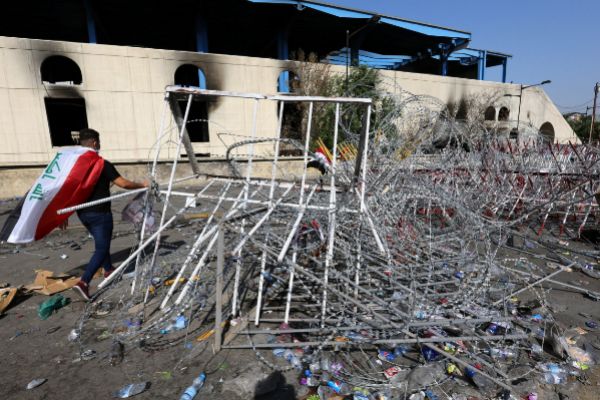- Middle East: Post-Saddam Iraq is reeling: 42 dead and more than 2000 injured in a new day of protests
The resumption of protests and the bloody balance of their first day, with 42 dead and more than 2,300 wounded, keeps Iraqi institutions completely paralyzed. The Parliament, which was to approve this Saturday the new reforms proposed by the Government, has postponed its emergency session between warnings by security forces against protesters and the finding of the abyss that separates the street from the corridors of power.
"Many attempts have been made from the Government and both Parliament and the parties have played their part to reach a midpoint, accelerating reforms, especially in the public services sector, that are acceptable to the people and fulfill their wishes," points to EL MUNDO Jwan Ihsan, head of the Patriotic Union of Kurdistan in the Iraqi Parliament. A feeling shared by other deputies such as Sarkawt Shams. "The dialogue is increasingly difficult. Some efforts have been made but they are not radical reforms," he acknowledges.
The street, however, censures the aesthetic reforms and demands the change of the lighting system after the American invasion of the country and the decline of Saddam Hussein. The crowds that took Baghdad and seven provinces in southern Iraq on Friday demand an adjustment of accounts with the political elite that has administered the country since 2003 and that they accuse of corruption and neglect by not providing public services and jobs to young people.
"The Iraqis have returned to the streets because they consider them the only existing channel to show their complaints. For many, elections and formal politics is not the way to have a voice," Renad Mansour, an analyst at Chatham House, tells this newspaper. The movement, heterogeneous and orphan leader, has also prevented politicians from trying to capitalize on their calls for change.
Lack of consensus
Hundreds of souls have gathered this Saturday near the Green Zone, where government headquarters and embassies are located. Parliament, also within its limits, has canceled due to lack of quorum the session set to discuss the proposals of Prime Minister Adel Abdel Mahdi. Since the protests erupted on October 1, the Hemicycle has held only four sessions with the reforms as an agenda. The institution, like many other state bodies, is being debated between the defenders of the "status quo" and those who promote a change to leave the quagmire that crosses the country.
"Parliament is the only institution that can do something to cool the demonstrations," admits Shams, restless about drifting. To the repression that left 157 dead and 5,494 injured earlier this month, the balance of Friday is now added: 42 victims and more than 2,300 injured. Late on Friday, 12 people lost their lives in the fire declared during the assault on the offices of Shiite Hashid Shaabi militias in the city of Diwaniya, 180 kilometers south of Baghdad.
The protests degenerated into clashes between security forces, protesters and the powerful and unpopular Shiite militias, backed by Iran and integrated into the Interior Ministry whose power and autonomy has been growing in recent years. Nearly thirty buildings were grazing with llamas and the curfew spread across eight provinces of the country, including Basra, Kerbala and Diwaniya.
After the day of violence, law enforcement issued warnings against those who participated in the street response. "When Iraq is witnessing peaceful protests, some rioters have attacked private property and property. Iraqi security will consider these individuals as terrorists and will be treated in that way, " said a statement from the joint command of the security forces. On Monday, a report by the government committee appointed by Baghdad acknowledged that the agents had signed "excessive use of force" and recommended the cessation and judicial provision of a dozen police and army commanders.
The Interior Ministry has defended its performance on Friday despite the dissemination of videos on social networks denouncing the brutality of the uniformed, who threw tear gas and sound bombs and fired into the air. "The security forces guaranteed the protection of the demonstrations with responsibility and in an exercise of great moderation, refraining from using firearms and excessive use of force against protesters," he said in a statement published on Saturday.
The authorities have also held the private security of some political parties responsible for opening fire on protesters in several provinces during the crowd's attempts to assault or set fire to the premises. "Many members of the security forces were injured during the protests after some individuals attacked our units with grenades and weapons," said the Interior Ministry.
According to the criteria of The Trust Project
Know more- Iraq
- Iran
Turkish offensive in Syria Gabriel Moushe, Syrian opponent: "Kurds are the losers of this crisis"
Repression At least 15 dead in another day of the endless and bloody wave of protests in Iraq
Middle East Royal mission against civilians and dozens of dead: the keys to violence in Iraq

